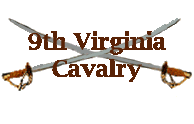
Taking Hits
Nothing is worse than hearing the spectators at a reenactment grumble about the lack of injury to soldiers on the battlefield. Likewise, nothing is more enjoyable to the ears of a good reenactor than to get a compliment later about the feigned injury he took out there. The audience appreciates it and the other reenactors do too. It makes it more realistic and it also gives the reenactor who decides to take a hit a more personal perspective on the war itself.
Taking hits and falling from your horse is the pinnacle of our efforts at hit taking. It requires training and attention to detail more than any other event we may portray on the battlefield.
First - I will jump on my soapbox here on hit taking philosophy. Hit taking will give you the respect of other units and EARLY hit taking will give you recognition that later in the battle will not be as appreciated because so many are doing it. Seems like most soldiers decide to take hits when their powder supply is all but gone, don't let this mentality affect you. You can always recycle when the opportunity presents itself.
Announce that you are going to take a hit to the men in the ranks quietly when you have that eye-contact of an enemy soldier that tells you a hit is coming - take it, or at least react to it! Don't DIE! Become a casualty, get a graze to the arm, hold your ear, knock off your hat, if you are dismounted - throw a leg out from under you and go down to rise again after the initial impact. Do something! Duck, waver, look over your shoulder at the man to your right or left to see if they are still standing, then continue to follow the commands of your officer. Wounded men still able to fight should stay with their company.
This article is written mainly to discuss hit taking on horseback but the philosophy is the same. React to the enemy - it will be appreciated and reciprocated.
Taking hits and staying IN the saddle. This is a good starting point for most mounted men. React to a wound yet keep your seat in the saddle. If you take an arm wound, remember to not use that arm! If you are gut shot, fold up and groan (gut shots don't usually hurt as much initially as do shots to the extremities). A shot in the thigh will require you to lose a stirrup and let your leg dangle useless. Remember to react to the danger and the lead flying around.
The steps you need to take before you are ready to fall from your horse are several and none should be overlooked.
TRUST! Your horse and you must be a good partnership. He must look to you for guidance and not look forward to the times he is out of your control and able to run away. To test your trust in your horse I would ask that you lay down next to your standing horse and expect that he will not trample on you. Do you have this kind of trust? If not, you need to build it.
WHOA! Your horse needs to know this command and practice it often. (There is a separate article written on these pages to help you teach your horse this command) The horse needs to remain calm on the battlefield and not be flighty. If in doubt, do not fall from your horse.
KNOW HOW TO FALL! Practice at training, learn to break your fall by doing dismounts in odd ways. The safest fall is one where you fall to either side of your horse while holding onto his mane to let yourself down easy. I position my horse where the side I will fall off of is away from the spectators. This helps make it look more realistic upon letting yourself down in a controlled fall. However, sometimes the situation does not present itself to do this so you have to adlib a bit.
Its important to get rid of straps, belts, sabres, carbines and other items that may get hung up on the saddle as well as get your feet out of the stirrups if you think you will be taking a hit off your horse. Drop your sabre out of sight of the spectators. Same goes for your carbine and cartridge box, those things hurt when you land on them! Some people have learned from their experiences how to fall safely but it usually takes doing it several times to teach the right way and the wrong way. One man caught his spur in the crupper of his horse and hung upside down for a few seconds before he freed himself. Another man had his carbine snap hook catch on his coat strap but luckily averted a disaster. In a moment of excitement I forgot to rid myself of my sabre and fell on it - I still suffer the injury to my tailbone landing on the sword hilt. We are all guilty at some time in our lack of attention to detail but this lack of attention might be our own undoing!
All of our falls are from horses at a standstill. I don't recommend taking a hit from a running horse unless you have lots of insurance and the abilities of a trained stunt man which is beyond the scope of this article.
Of course, if you get unseated for other reasons, feign injury anyway. Might as well make a bad situation work for the good of the battle. If you are REALLY hurt, don't hesitate to call out for help immediately!
Article written by Linneus Ahearn